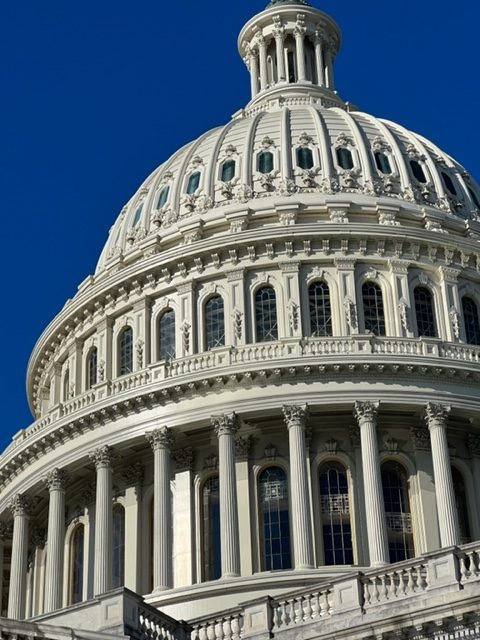Elephants & Donkeys
Elections: Inclusion, concerns, and participation by those with mental health issues.
The time of seasonal decorations is getting ready to be set up in every home across America and the smells of hot chocolate are scenting the chilly air. Even with festivity and comfort everywhere, there is a day where individuals put that all aside to make an important decision that will greatly affect the nation, voting.
November 8th, was election day. A time where citizens in America take time to place their vote in the midterm elections that determine which person gets a seat in one of the 435 seats available in the House of Representatives and a seat in one of 35 seats available of the 100 seats in the Senate. Candidates have campaigned for months to make sure the citizens have seen their values and the reason why they would be a good fit for a seat in the desired position they would like to achieve. Millions of ballots have been cast – which is about 4 in every 10 people in the US. You can imagine how many more were cast in person on November 8th. But why? Voting has been attracting more citizens in the past years than ever before. Many believe that voting is a civic duty that people are obligated to take part in. The outcomes of the process will determine the people who are in charge to shape the nation and if people don’t try to make their voice heard from going to the polls, then there is no point for those individuals to complain about who was elected and why. Going to polls shows that an individual participated. It is possible that one vote may have influenced the outcome of a particular election. If voting is so important, then why do so many people not participate? Why don’t people go to the polls or vote from the comfort of their home? Simple answer, a combination of distress and benefits.
Whether it is acknowledged or not, mental health can play a significant impact on voter participation. The after effects of placing the ballot into the box is both positive and negative.
“After voting, there’s this unexplainable feeling that rises up inside of me, said Dr. Shawn Perry, Principal of Frisco High School. “It’s the feeling of excitement, accomplishment, and that I did something that will play an important part in my country. In a way, it makes me feel important, ‘famous’, and prideful.”
What he is feeling is not an uncommon thing for voters to feel. According to a study published in Political Psychology in 2009 by Professor Malte Klar from University of Gottingen in Germany and by Professor Time Kasser from Knox College in Galesburg, Illinois, “… significantly larger percentages of activists met preexisting criteria for ‘human flourishing’ than did less engaged in activism … [and they also had] significantly higher levels of subjective vitality than their peers who had engaged in a non activist behavior.”
This shows us that there is a direct link between happiness of people who did and didn’t vote, probably because doing something good releases dopamine that makes you feel a feeling of pleasure and satisfaction. Even if voting can make a person happy and make that feeling stick with them for a few days, imagine if it helped alleviate distress.

In 2001, Lynn Sanders, an associate professor in the Department of Politics at the University of Virginia in Charlottesville, presented the findings of a study she conducted on political participation and its psychological benefits at the Annual Meeting of the American Political Science Association in San Francisco, CA. In her study paper, it says, “… participation appeared to alleviate psychological distress, which might offset some of the negative mental health consequences associated with disadvantaged social status … by historically oppressed groups is higher exposure to unfair treatment, including discrimination due to race and gender … disadvantaged social status is significantly correlated with mental health.”
From this we can conclude that voting is a way that an individual can alleviate stress. But how? Sanders says that discrimination and being disadvantaged can have an immediate poor effect on mental health. If these topics were being debated by the candidates, then additional individuals could be encouraged to vote. Whe people become politically active, it often gives individuals a sense of empowerment. This is where voting “transforms … [into] more like the act of protest or fighting.”
Sanders also noticed that the participants who seemed to benefit the most from political participation were those more “prone to psychological distress,” such as depression, anxiety, and stress. She says that, “…[l]ower voting rates are consistently associated with poor self-rated health.”
According to an article by Aljazeera, “US Elections: How Does Depression, Anxiety Influence Voter Turnout, ” it states, “… voting is a physical activity that requires energy that someone experiencing depression may not have … [and] individuals experiencing depression may also lack the motivation to participate in not just the act of voting, but also the political process as a whole. That includes one’s interest in politics, as well as a negative effect on a person’s internal efficacy – the belief that one understands enough about politics that he/she is therefore capable of participating. This illustrates that the real problem is social connectedness.

Misha Patel, a freshman at Frisco High School agrees with this finding. “Individuals who struggle with mental health illnesses are the ones who seem like they are easily neglected in getting their voice heard,” Misha said. “Ever since the beginning of time, to even present-day when events like the mid-term elections take place, it looks like there isn’t enough efforts done by the candidates to make sure everyone – from race, ethnicity, and to disability – to be heard from.”
Multiple studies explain how individuals with disabilities often have social and physiological effects that interfere with the voter turnout because of decreased social capitals and identifications through mainstream societies.
A “social capital” is a term that refers to a similar phrases and words such as “values, beliefs, networks, social relations, or institutions.” This ultimately means that the main reason why individuals with depression and similar mental health illnesses, like anxiety, don’t participate much in voting – or politics, in general – is because of the lack of connection the candidates try to do with such communities.
According to the Journal of Epidemiology and Community Health, “… people with chronic obstructive pulmonary disease and people with cancer were more likely to vote than people with mental health conditions, alcohol abuse disorder, or neurodegenerative conditions … [because of them] … having strong support networks within the cancer community might help encourage voting behavior.” This ultimately shows us that the main reason that voting brings distress to individuals, especially in the community of mental health needs, is because of the lack of resources that are given to them in a manner of their comfort. For people in such a community, extra words of encouragement and active communication is important for them because the situations they are dealing with are all in a mental aspect, not a physical one.
Voting is a form of art where your voice can have a major effect towards decisions that can affect your life and others in a significant way. But the voices that are being heard should not all be from the same perspective, but from different ones. It is important to encourage different perspectives. It may take time and effort, but many agree that if the effort is made, it will lead to a positive outcome.
Including citizens with mental health issues in the voting process may help others see what these individuals want in their candidates. “There might be candidates who touch base on problems in the mental health community,” said Misha Patel, “including inclusion, but just imagine if there was more. If there were only more posters, videos, and advocating to encourage everyone to vote. Many people have had enough hearing from candidates who’ve said they wanted to include everyone with their actions that they would like to impose in the future and connect with them, but when is progress actually going to be portrayed? When will this community and many others achieve this concept of inclusion? Because I know, many people are waiting for that day to arrive. And when this does happen, it’s a promise that America will get a step closer to reaching its goal of fulfilling the American dream for everyone.”
Works Cited
Gottbrath, Laurin. “US elections: How do depression, anxiety influence voter turnout?” Al Jazeera, 9 October 2020, https://www.aljazeera.com/economy/2020/10/9/us-elections-how-do-depression-anxiety-influence-voter-turnout. Accessed 15 November 2022.
Newman, Tim, et al. “Health and voting: Exploring links between health and voter behavior.” Medical News Today, 11 September 2020, https://www.medicalnewstoday.com/articles/how-does-health-influence-voting-behavior#Why-might-this-relationship-exist? Accessed 15 November 2022.
Ojeda, Christopher. “Depression and Political Participation – PMC.” NCBI, 9 June 2015, https://www.ncbi.nlm.nih.gov/pmc/articles/PMC4764256/. Accessed 15 November 2022.
Your donation will support the student journalists of Frisco High School. Your contribution will allow us to improve our site, continue printing the paper and participate in contests. Additionally, it will help cover membership fees or purchase equipment as necessary.



